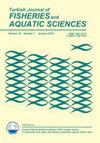Microalgae and Cyanobacteria, a Promising Source of Antimicrobial Molecules Against Aquatic Pathogen
IF 1.7
4区 农林科学
Q3 FISHERIES
引用次数: 0
Abstract
Genus Vibrio is involved in common pathologies of aquaculture fish species, being responsible for significant economic losses for that industrial activity. Microalgae and cyanobacteria have demonstrated to count on bioactive compounds able to diminish mortality and morbidity by their use as functional food supply or by addition of those bioactive compounds previously purified. The main goal of this work has been to evaluate the anti-microbian effect (growth of bacterial population measured as changes in optical density) of 25 microalgae extracts on the bacterial strain Vibrio anguillarum CECT 522T. Stock microalgae extracts were obtained from lyophilized biomass treated with methanol 99.9%. A total of thirteen extracts exhibited antibacterial activity. The highest activity corresponded to Monochrysis lutheri, followed by Hemiselmis cyclopea, Porphyridium cruentum, Tetraselmis rubens, Cryptomonas sp, Navicula sp. The anti-bacterial activity was not related to a taxonomic group, indicating species-specific or even strain-specific activity.微藻和蓝藻是对抗水生病原体的有前景的抗菌分子来源
弧菌属与水产养殖鱼类的常见病症有关,对该工业活动造成重大经济损失。微藻和蓝藻已被证明依靠生物活性化合物来降低死亡率和发病率,通过将其作为功能性食品供应或通过添加先前纯化的生物活性化合物。本研究的主要目的是评估25种微藻提取物对鳗弧菌CECT 522T菌株的抑菌作用(以光密度变化测量细菌种群的生长)。经甲醇处理的冻干生物质可获得99.9%的原始微藻提取物。共有13个提取物具有抗菌活性。其抑菌活性最高的是Monochrysis lutheri,其次是cyclopea半球菌、Porphyridium cruentum、Tetraselmis rubens、Cryptomonas sp、Navicula sp。其抑菌活性与分类类群无关,表明其具有种特异性甚至是菌株特异性。
本文章由计算机程序翻译,如有差异,请以英文原文为准。
求助全文
约1分钟内获得全文
求助全文
来源期刊

Turkish Journal of Fisheries and Aquatic Sciences
FISHERIES-MARINE & FRESHWATER BIOLOGY
CiteScore
3.10
自引率
0.00%
发文量
43
审稿时长
3 months
期刊介绍:
Turkish Journal of Fisheries and Aquatic Sciences" (TrJFAS) is a refereed academic journal has been published by Central Fisheries Research Institute of Turkey and Japan International Cooperation Agency (JICA), and published in English.
It aims to address research and needs of all working and studying within the many varied areas of fisheries and aquatic sciences.
The Journal publishes English language original research papers, critical review articles, short communications and technical notes on applied or scientific research relevant to freshwater, brackish and marine environments.
TrJFAS was published biannually (April & November) between 2001 and 2009. A great number of manuscripts have been submitted to the journal for review from acceptance of the SCI index. Thereby, the journal has been published quarterly (March, June, September and December) from 2010 to 2017. The journal will be published monthly in 2018.
 求助内容:
求助内容: 应助结果提醒方式:
应助结果提醒方式:


